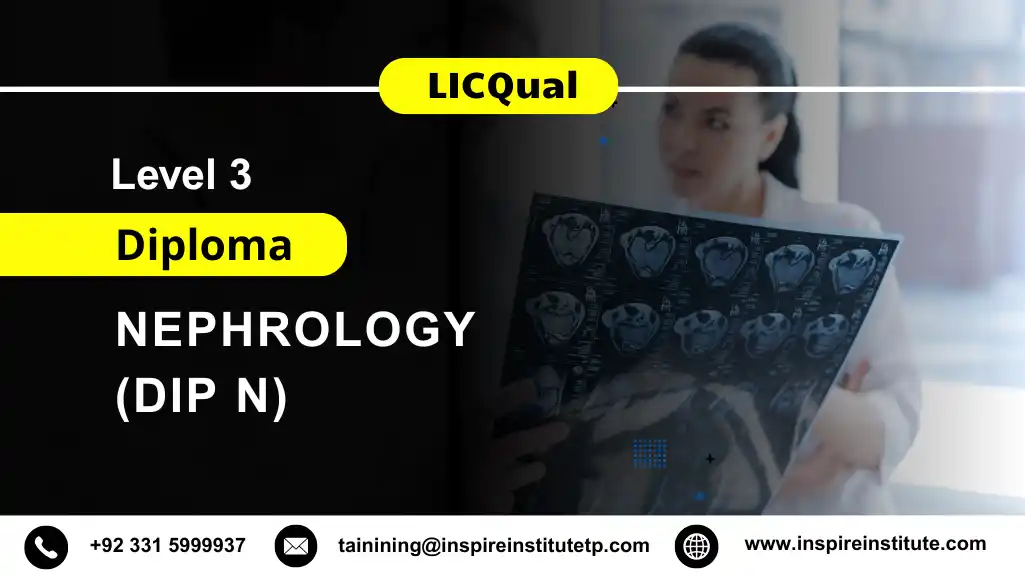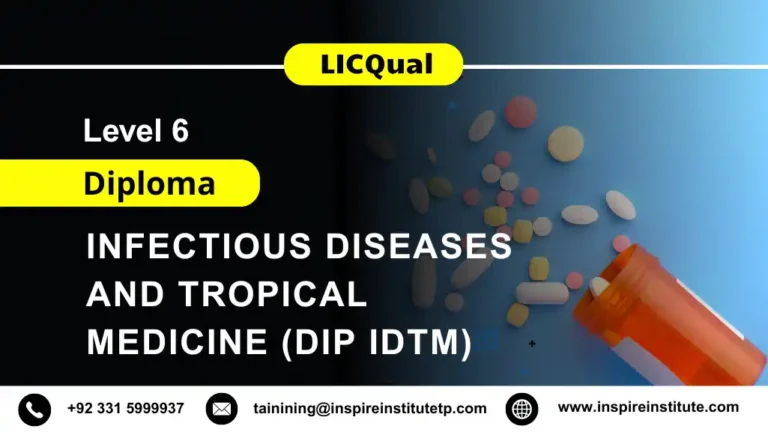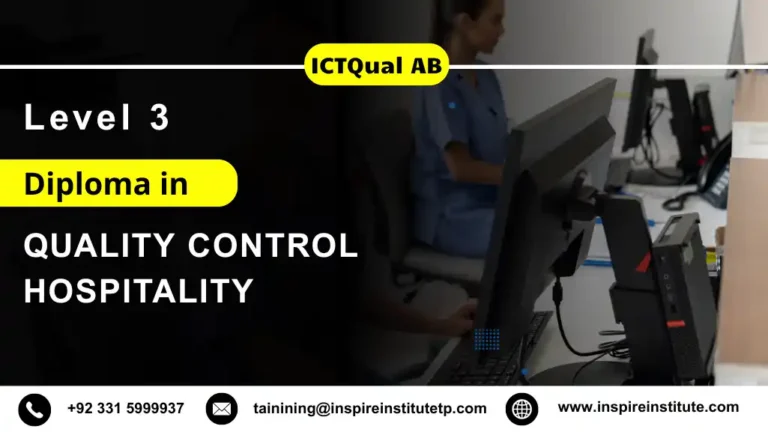LICQual Level 3 Diploma in Nephrology (Dip N)
The LICQual Level 3 Diploma in Nephrology (Dip N) is a comprehensive, UK-accredited qualification designed to equip learners with the knowledge and clinical understanding required to manage kidney-related diseases effectively. As the global prevalence of chronic kidney disease (CKD), renal failure, and hypertension continues to rise, the demand for trained nephrology professionals has never been greater. This course provides a solid academic and practical foundation for healthcare practitioners seeking to specialize in nephrology or enhance their clinical competence in renal medicine.
The purpose of this Diploma in Nephrology is to develop advanced understanding and clinical insight into kidney physiology, renal pathophysiology, and treatment strategies for nephrological disorders. Learners explore diagnostic methods, renal replacement therapies, pharmacologic interventions, and preventive healthcare measures. The course bridges theoretical learning with practical application, ensuring participants gain a deep understanding of both acute and chronic renal conditions and their management in clinical settings.
Throughout the Dip N qualification, learners will acquire specialized skills in assessing, diagnosing, and managing renal diseases. They will learn to interpret laboratory results such as serum creatinine, GFR, and electrolyte levels, as well as imaging findings essential for kidney evaluation. By mastering patient monitoring and treatment planning techniques, learners will be equipped to provide evidence-based, patient-centered nephrology care that aligns with international healthcare standards.
Practical application forms a cornerstone of this nephrology course, with case-based learning, clinical simulations, and real-world patient scenarios enhancing diagnostic and problem-solving abilities. Students engage with renal function assessment, dialysis procedures, and kidney transplant case studies to gain hands-on understanding. This experiential learning approach ensures that graduates can confidently apply clinical knowledge in hospitals, dialysis centers, and primary healthcare environments.
Delivered as a flexible, assignment-based programme, the LICQual Level 3 Diploma in Nephrology accommodates both working professionals and aspiring healthcare learners. It promotes academic excellence and practical relevance through interactive modules, personalized tutor support, and structured learning materials. The curriculum is carefully designed to align with global healthcare competencies, helping learners achieve professional growth without compromising their existing responsibilities.
By completing the LICQual Level 3 Diploma in Nephrology (Dip N), learners will be well-prepared to advance their careers in renal healthcare, dialysis management, and clinical nephrology services. This qualification empowers participants to contribute meaningfully to patient care, medical research, and healthcare innovation in kidney disease management. It serves as a stepping stone toward specialized medical roles and higher-level qualifications in nephrology and internal medicine.
Why Choose this Qualification
The LICQual Level 3 Diploma in Nephrology (Dip N) is a UK-accredited professional qualification that provides a strong foundation in kidney health, renal pathophysiology, and clinical nephrology. With chronic kidney disease and renal failure cases rising globally, healthcare systems increasingly require skilled nephrology professionals capable of delivering high-quality patient care. This diploma bridges academic theory with clinical practice, preparing learners for essential roles in nephrology, dialysis management, and kidney healthcare services. Whether you are an aspiring medical professional or an experienced practitioner, this qualification helps you gain specialized skills, recognized credentials, and a competitive edge in the healthcare industry.
Key Reasons to Choose this Qualification
1. Comprehensive Knowledge of Kidney and Renal Function
• Gain in-depth understanding of kidney anatomy, physiology, and renal system functions.
• Learn to identify and analyze common nephrological disorders such as CKD, nephritis, and renal failure.
• Study how systemic diseases like diabetes and hypertension affect kidney health.
• Understand the mechanisms behind renal filtration, electrolyte balance, and fluid regulation.
• Build a strong theoretical foundation to support evidence-based clinical practice.
2. Advanced Diagnostic and Clinical Assessment Skills
• Develop the ability to interpret diagnostic tests such as GFR, creatinine, and urinalysis.
• Learn the application of imaging technologies like renal ultrasound and CT scans.
• Acquire expertise in early detection, disease staging, and treatment monitoring.
• Strengthen analytical reasoning to interpret data and make accurate clinical decisions.
• Gain hands-on understanding of diagnostic protocols used in nephrology departments.
3. Focus on Evidence-Based and Preventive Nephrology
• Study current international clinical guidelines for kidney disease management.
• Learn how to implement evidence-based interventions in acute and chronic renal cases.
• Understand preventive strategies for reducing kidney disease progression.
• Explore nutritional and lifestyle approaches to support renal health.
• Build the ability to apply scientific research in clinical practice.
4. Practical Learning and Real-World Application
• Engage in case studies and clinical simulations reflecting real nephrology scenarios.
• Develop practical competence in dialysis procedures and patient care management.
• Apply classroom knowledge to clinical settings, promoting confidence and readiness.
• Strengthen problem-solving skills through interactive and experiential learning methods.
• Ensure practical alignment with global healthcare standards for nephrology care.
5. Recognised UK Qualification and Global Relevance
• Earn a UK-accredited diploma recognized by healthcare institutions worldwide.
• Align your qualification with international nephrology education and training standards.
• Enhance professional credibility with a qualification respected by employers globally.
• Open career opportunities across hospitals, research institutions, and dialysis centers.
• Gain a lifelong credential that supports continued professional development.
6. Flexible and Accessible Learning Pathway
• Study through an assignment-based model designed for working professionals.
• Manage your learning schedule with flexible pacing and remote access to course materials.
• Receive personalized tutor support to enhance comprehension and performance.
• Access a variety of digital learning tools, resources, and assessments.
• Balance study with existing career and personal commitments effectively.
7. Enhanced Career Prospects in Healthcare and Nephrology
• Prepare for diverse roles such as Nephrology Technician, Dialysis Specialist, or Clinical Support Worker.
• Build a strong foundation for progression into advanced nephrology or biomedical programs.
• Strengthen employability with globally transferable skills in patient care and diagnostics.
• Gain recognition as a qualified professional in kidney and renal health management.
• Enhance opportunities for career growth within both private and public healthcare sectors.
8. Contribution to Quality Renal Care and Patient Outcomes
• Learn how to support early detection and effective management of kidney diseases.
• Improve patient outcomes through accurate diagnosis and individualized care plans.
• Develop empathy, communication, and ethical decision-making in clinical practice.
• Contribute to the advancement of community and hospital-based nephrology services.
• Play an active role in promoting kidney health awareness and preventive care initiatives.
The LICQual Level 3 Diploma in Nephrology (Dip N) stands out as a comprehensive and career-focused qualification that equips learners with the clinical knowledge, diagnostic precision, and professional competence essential in today’s healthcare sector. By completing this programme, you will be prepared to deliver safe, effective, and compassionate renal care across diverse healthcare environments. This diploma not only strengthens your professional credentials but also empowers you to make meaningful contributions to improving kidney health and patient outcomes worldwide.
Course Overview
LICQual UK Awarding Body
Average Completion Time:
4-12 Months
Study Units: 6 Units
Evidence & Assignment Based
Mandatory Units
Who Should Take This Course
The LICQual Level 3 Diploma in Nephrology (Dip N) is a UK-accredited qualification designed for individuals seeking to develop specialized knowledge and clinical competence in kidney health and nephrology. This comprehensive programme bridges theoretical learning with real-world medical applications, making it ideal for healthcare professionals and aspiring practitioners looking to advance in the field of renal care, dialysis management, and kidney disease prevention. The course provides essential insights into renal physiology, diagnostics, and patient care — empowering learners to excel in hospitals, diagnostic centers, research laboratories, and community healthcare environments.
This Course is Suitable For
Healthcare Professionals and Nurses
• Ideal for registered nurses and healthcare assistants aiming to specialize in nephrology and renal patient management.
• Enhances understanding of kidney function, chronic kidney disease (CKD), and renal failure treatments.
• Builds confidence in performing patient assessments, monitoring dialysis, and managing long-term kidney conditions.
• Equips professionals with updated clinical practices and evidence-based approaches to kidney care.
• Supports continuous professional development and career advancement in healthcare.
Medical and Allied Health Students
• Perfect for students pursuing studies in medicine, biomedical science, or clinical practice.
• Provides foundational knowledge in renal physiology and nephrological diseases.
• Encourages early specialization for learners interested in diagnostic and therapeutic nephrology.
• Strengthens research, analysis, and diagnostic interpretation skills.
• Prepares learners for progression to higher-level qualifications in nephrology or internal medicine.
Dialysis Technicians and Clinical Support Workers
• Designed for professionals working in dialysis centers or hospital renal units.
• Enhances technical skills in operating and maintaining dialysis machines.
• Develops understanding of dialysis protocols, infection control, and patient monitoring.
• Teaches practical troubleshooting and patient safety standards in dialysis management.
• Increases job readiness for higher responsibilities in renal care departments.
Laboratory and Diagnostic Technicians
• Suitable for professionals involved in medical laboratory testing and diagnostic imaging.
• Strengthens knowledge of renal biomarkers, blood tests, and urinalysis interpretation.
• Improves accuracy in laboratory result analysis and reporting for nephrology patients.
• Promotes awareness of laboratory safety, ethics, and quality control measures.
• Supports advancement into specialized diagnostic roles within nephrology departments.
Community and Public Health Practitioners
• Beneficial for professionals involved in preventive healthcare and chronic disease management.
• Provides insight into early detection, community education, and awareness of kidney diseases.
• Encourages implementation of lifestyle interventions to reduce renal health risks.
• Equips learners with communication and outreach skills for patient and community engagement.
• Strengthens contribution to public health campaigns focused on kidney wellness.
Healthcare Administrators and Policy Officers
• Ideal for healthcare managers and coordinators overseeing nephrology or dialysis programs.
• Enhances understanding of renal healthcare systems, policies, and service delivery models.
• Supports data-driven decision-making and performance evaluation in healthcare settings.
• Improves leadership skills for effective team and clinical resource management.
• Promotes efficient coordination between clinical, administrative, and technical staff.
Biomedical and Life Science Graduates
• Suitable for graduates seeking to apply biological knowledge in clinical nephrology.
• Offers an applied understanding of renal biology, physiology, and pharmacology.
• Builds competence in research methods, data interpretation, and case study analysis.
• Encourages transition into clinical or laboratory-based nephrology roles.
• Provides a valuable stepping stone toward postgraduate specialization.
International Learners and Career Changers
• Welcomes individuals from diverse academic or professional backgrounds interested in healthcare.
• Offers global recognition, making it ideal for learners seeking international healthcare careers.
• Provides flexible, assignment-based learning suited for working professionals.
• Builds transferable skills in medical terminology, analysis, and communication.
• Enables learners to transition confidently into healthcare and clinical support roles.
The LICQual Level 3 Diploma in Nephrology (Dip N) is the perfect qualification for healthcare professionals, students, and career changers seeking to specialize in kidney and renal health. With a blend of theoretical learning and applied practice, this course prepares learners to deliver exceptional care, support patient outcomes, and contribute meaningfully to the field of nephrology. By earning this globally recognized diploma, candidates can enhance their expertise, career prospects, and professional credibility in the growing field of renal healthcare.
Course Benefits
The LICQual Level 3 Diploma in Nephrology (Dip N) provides significant benefits for individuals aiming to develop expertise in kidney health, renal physiology, and the management of kidney-related disorders. By integrating essential theoretical understanding with applied clinical practice, this diploma prepares learners to deliver safe and effective nephrology care, support early intervention, and contribute to preventive kidney health strategies. Designed as a flexible, assignment-based programme, it promotes professional growth while ensuring academic excellence and relevance in the modern healthcare environment.
Key Benefits of the Course:
- Specialist Knowledge:
Gain a comprehensive foundation in renal anatomy, physiology, and kidney function. Learners explore the diagnosis and management of kidney diseases such as acute kidney injury, chronic kidney disease, glomerulonephritis, and nephrotic syndrome. The course also covers fluid and electrolyte balance, dialysis principles, and patient-centered nephrology care, enabling learners to make informed, evidence-based decisions in kidney health management. - Practical Application:
Develop hands-on skills in monitoring renal function, supporting dialysis procedures, and interpreting laboratory and diagnostic results. Learners gain competence in recognizing early signs of renal disorders, assisting in treatment plans, and applying best practices within hospital, clinical, and community settings. The programme ensures graduates can translate theoretical knowledge into effective nephrology and renal care practices. - Recognised Qualification:
Earn a UK-accredited diploma that certifies your professional knowledge and competence in nephrology. This qualification aligns with international standards in healthcare and renal medicine, making it valuable for career development across hospitals, renal clinics, dialysis centers, research institutions, and global health organizations. - Flexible Learning Pathway:
Benefit from an assignment-based learning structure that supports learners in balancing study with work or personal commitments. The LICQual Level 3 Diploma in Nephrology (Dip N) is ideal for healthcare assistants, nursing students, and individuals seeking to specialize in renal health within a flexible and accessible academic framework. - Evidence-Based Training:
Stay up to date with the latest research, clinical guidelines, and innovations in nephrology care. Learners are trained to implement evidence-based practices for early detection, treatment, and long-term management of kidney diseases, emphasizing patient safety, quality care, and improved health outcomes. - Career Development:
Enhance your professional prospects across a wide range of healthcare sectors, including hospitals, dialysis units, community health programs, and nephrology research. This diploma opens doors to roles in renal healthcare support, patient care coordination, and allied medical services, as well as progression to advanced studies in medicine, nursing, or clinical nephrology. - Enhanced Kidney Care Delivery:
Contribute to improved kidney health and patient well-being through effective disease prevention, monitoring, and treatment support. Learners gain the ability to assist in dialysis management, provide nutritional and lifestyle guidance, and participate in public health initiatives promoting kidney health awareness. - Professional Growth:
Develop strong communication, analytical, and clinical decision-making skills essential for engaging with patients and healthcare teams. The course also instills professional ethics, empathy, and teamwork—key attributes for success in nephrology and broader healthcare environments.
The LICQual Level 3 Diploma in Nephrology (Dip N) equips learners with essential renal healthcare knowledge, practical clinical skills, and a UK-recognised qualification. It empowers healthcare professionals and aspiring practitioners to promote kidney health, support effective patient management, and contribute to global nephrology care initiatives.to global healthcare excellence in rheumatology and musculoskeletal medicine.
Eligibility Criteria
The LICQual Level 3 Diploma in Nephrology (Dip N) is a UK-accredited qualification designed for healthcare professionals, nursing assistants, laboratory technicians, and aspiring clinicians who wish to develop a thorough understanding of nephrology, renal physiology, and kidney disease management. This assignment-based programme integrates essential theoretical knowledge with clinical applications, making it ideal for individuals seeking to specialize in renal healthcare or progress within the medical field. Learners who meet the entry criteria will be equipped with the knowledge and practical understanding required to excel in nephrology and contribute effectively in hospitals, dialysis centers, clinics, and research facilities.
Educational Background:
Applicants should possess a recognised qualification in healthcare, medicine, nursing, or a science-related discipline. Candidates holding a Level 2 or Level 3 qualification in healthcare practice, medical sciences, biology, nursing, or allied health are eligible to apply. Individuals with equivalent international qualifications will also be considered, provided that their credentials meet the academic standards of the programme. The course is particularly suited for those with a background in medical technology, life sciences, or healthcare support who wish to build expertise in nephrology, renal function, and kidney disease management.
Professional Experience:
Previous experience in healthcare or clinical environments is advantageous but not mandatory. A minimum of one year of relevant experience in a healthcare-related role—such as nursing, medical assistance, patient care, or laboratory work—is recommended. Applicants who have worked in hospitals, dialysis units, or healthcare clinics will find the course particularly beneficial. However, motivated individuals without direct clinical experience but with a strong interest in nephrology and kidney health are also encouraged to apply, as the programme provides a robust foundation to support career development and further study.
Age Requirement:
Learners must be at least 18 years of age at the time of enrollment. This ensures that students possess the maturity, professionalism, and ethical understanding required to engage with the scientific, clinical, and practical aspects of nephrology. The age requirement reflects the professional nature of the diploma and prepares learners to apply their knowledge effectively within real-world healthcare and patient care settings.
Language Proficiency:
As the LICQual Level 3 Diploma in Nephrology (Dip N) is delivered and assessed in English, all learners must demonstrate adequate proficiency in reading, writing, and communication. Non-native English speakers are required to have an IELTS score of 6.0 or an equivalent qualification to ensure they can engage effectively with academic content, complete written assignments, and communicate confidently in professional healthcare environments. Proficiency in English is essential for understanding medical terminology, interpreting clinical data, and preparing reports within nephrology and renal care contexts.
Technical Requirements:
Applicants must have access to a computer or laptop with a reliable internet connection, as the programme is conducted through an online, assignment-based format. Basic IT literacy is required for navigating online learning platforms, conducting research, and submitting coursework electronically. Familiarity with word processing, presentation tools, and online academic databases will enhance the learning experience and ensure smooth progress throughout the course.
Required Documents:
To successfully complete the registration process, applicants are required to submit the following documents:
A valid passport or national identification card for identity verification.
Copies of educational qualifications, such as certificates or academic transcripts.Evidence of professional or relevant work experience, if applicable. For international applicants, certified translations of documents may be required for verification and authenticity.
The Qualification Process
LICQual Level 3 Diploma in Nephrology (Dip N)follows a structured pathway to ensure learners gain comprehensive knowledge, practical skills, and professional competence in community oral healthcare.
Step 1: Self-Assessment
Learners review the entry requirements to confirm eligibility. Candidates with a background in dentistry, oral health, or public health are encouraged to apply.
Step 2: Registration
Complete the registration process by submitting required documents such as proof of qualifications, a valid ID, and payment of enrollment fees.
Step 3: Induction
An induction session is conducted to:
- Verify learner eligibility and documentation.
- Introduce study materials, learning outcomes, and assessment procedures.
Step 4: Learning and Evidence Submission
Learners complete assignments, case studies, and practical exercises demonstrating competence in public health dentistry, community oral health assessment, preventive strategies, and program planning.
Step 5: Feedback and Revision
Assessors review submitted evidence and provide constructive feedback. Learners can revise and resubmit work to meet all required standards.
Step 6: Competence Validation
Final submissions are evaluated to confirm that learners have met all theoretical and practical learning outcomes.
Step 7: Internal Quality Assurance (IQA)
The IQA team reviews the assessment process to ensure accuracy, fairness, and compliance with international standards.
Step 8: External Verification (EQA)
External verifiers validate the authenticity and quality of learner achievements.
Step 9: Certification
Upon successful verification, learners are awardedLICQual Level 3 Diploma in Nephrology (Dip N) , demonstrating advanced proficiency in community oral healthcare and preparing them for professional growth in dental public health, preventive dentistry, and healthcare policy.







